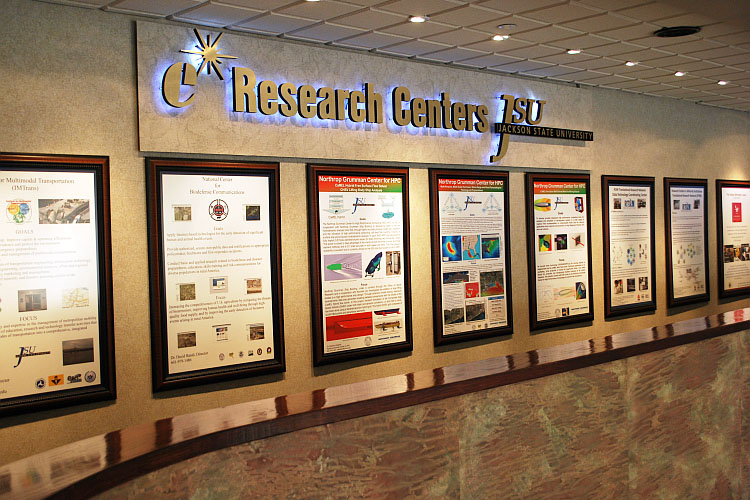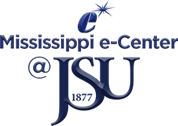
Research Centers, Institutes and Laboratories
The MS e–Center @ JSU attracts and supports research centers, institutes and laboratories dedicated to scientific excellence and innovative technology. As the MS e-Center@JSU creates a favorable business, research and development environment, it identifies governmental incentives and tax breaks and philanthropic and corporate resources.
Some of the major multidisciplinary research, development and planning programs in operation at the MS e–Center @ JSU include:
The Center for Business Development and Economic Research (CBDER) was established as a component of the College of Business at Jackson State University in 1989. The purpose of the Center for Business Development and Economic Research (CBDER) is to coordinate research and service functions of the College of Business. The Center creates, promotes and supports a research and development environment at the University by providing faculty and staff support in research, technical and publication assistance. The Center strives to further basic and applied research in business, economics, business management and related public policy areas. Additionally, the Center strives to promote the availability and improved quality of business, economic and related public policy information. The CBDER is composed of two units that highlight the College of Business’s primary mission of teaching, research and service.
Website: http://www.jsums.edu/business/cbder/
 The Department of Homeland Security Center of Excellence (CHC) / Center for Analysis and Response to Coastal Hazards (ARCH) performs research and develops education programs to enhance the Nation’s ability to safeguard populations, properties, and economies from catastrophic natural disasters.
The Department of Homeland Security Center of Excellence (CHC) / Center for Analysis and Response to Coastal Hazards (ARCH) performs research and develops education programs to enhance the Nation’s ability to safeguard populations, properties, and economies from catastrophic natural disasters.
Website: http://www.dhs.gov/homeland-security-centers-excellence
 The Data and Technology Coordinating Center (DTCC) at Jackson State University (JSU) serves as the hub of the National Institutes of Health (NIH) supported Research Centers at Minority Institutions (RCMI) Translational Research Network (RTRN). RTRN was formed through a $16 million, 5 year NIH grant, awarded to Charles Drew University by the National Center for Research Resources (NCRR) and the National Center for Minority Health and Health Disparities. Of this grant, JSU was awarded more than $8 million to establish the RTRN DTCC, which manages the data collection and analysis from multi-institutional clinical trials and biomedical research projects, facilitates the sharing of research tools and information technology resources, and facilitates the communication and collaborations of hundreds of research scientists in and outside of the network.
The Data and Technology Coordinating Center (DTCC) at Jackson State University (JSU) serves as the hub of the National Institutes of Health (NIH) supported Research Centers at Minority Institutions (RCMI) Translational Research Network (RTRN). RTRN was formed through a $16 million, 5 year NIH grant, awarded to Charles Drew University by the National Center for Research Resources (NCRR) and the National Center for Minority Health and Health Disparities. Of this grant, JSU was awarded more than $8 million to establish the RTRN DTCC, which manages the data collection and analysis from multi-institutional clinical trials and biomedical research projects, facilitates the sharing of research tools and information technology resources, and facilitates the communication and collaborations of hundreds of research scientists in and outside of the network.
Collaborating in cyber workgroups and utilizing the technological resources available through the DTCC, the researchers at the RCMI centers are focusing on improving health outcomes in five disease areas; Cancer, Diabetes/Obesity, Cardiovascular, HIV/AIDS, and Neuroscience that disproportionately affect ethnic populations. RTRN researchers collaborate using the resources of the DTCC to conduct research to eliminate these diseases and to improve health for the millions affected by these diseases, especially those from underserved communities. Several multi-million dollar active projects are being implemented in which the DTCC provides statistical analysis, study database build, remote data capture, clinical data management and communications in conjunction with leading research institutions including Harvard Medical School, University of California Los Angeles (UCLA) and others.
Website:http://rtrn.net/index.html
 The Science, Technology, Engineering, and Mathematics Scholars Teacher Academy Resident System (STEM STARS) model is supported by the National Science Foundation and is focused on improving the science and mathematics achievement of students in the Deep South by providing an innovative alternative route to teacher certification for STEM graduates.
The Science, Technology, Engineering, and Mathematics Scholars Teacher Academy Resident System (STEM STARS) model is supported by the National Science Foundation and is focused on improving the science and mathematics achievement of students in the Deep South by providing an innovative alternative route to teacher certification for STEM graduates.
The goal of the STEM STARS Institute is to offer a horizontal blending of teaching, research, and service as a tool to optimize learning for students in the Arkansas, Louisiana, and Mississippi region.
The objectives of the STEM STARS Institute are to recruit traditional and non-traditional students who possess:
- a solid background in STEM disciplines
- a commitment to teach in high-needs school districts
- a desire to develop connected science and mathematics educational ecosystem
- a determination to democratized science and mathematics classrooms and
- a resoluteness to produce a competitive STEM workforce
![]() The National Institutes of Health (NIH), a part of the U.S. Department of Health and Human Services, is the nation’s medical research agency — making important discoveries that improve health and save lives.
The National Institutes of Health (NIH), a part of the U.S. Department of Health and Human Services, is the nation’s medical research agency — making important discoveries that improve health and save lives.
Website: https://www.nih.gov/
